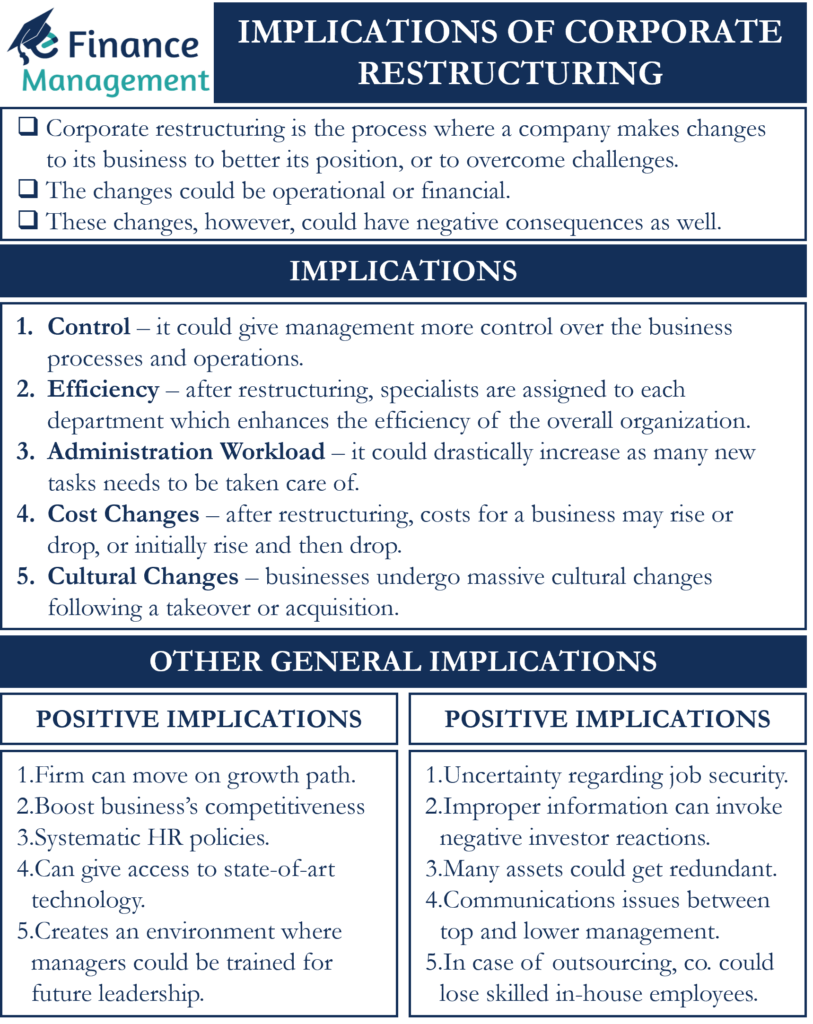Corporate restructuring is the process where a company makes changes to one or more of its businesses so as to better its position, or to overcome challenges. The changes could be operational or financial (to capital structure). Whatever the changes are, the objective of these changes is to make the business more efficient, in turn, create value for the shareholders. These changes, however, could have negative consequences as well. Thus, before going for restructuring, it is very important for the management to consider the implications of corporate restructuring. This will allow the company to make restructuring more effective, as well as address the issues before it gets too big.
Implications of Corporate Restructuring
The ultimate objective of restructuring is always to create value for the shareholders. But restructuring strategies could have negative consequences as well. Thus, it is very important for businesses to consider both the positive and negative implications of restructuring. Now, let’s look at the implications of corporate restructuring:
Control
Restructuring could give management more control over the business processes and operations. It is possible that after restructuring, a company may decide to bring some work in-house that it earlier outsourced. For this, the company may create departments. This would give the management more control over the work.
Efficiency
When a business is new, it is usually the founders who handle all the work and take all decisions. Such a work structure changes with restructuring. After restructuring, specialists are assigned to each department. Moreover, they get clear responsibilities and job roles. This, in turn, enhances the efficiency of the overall organization. For example, in small firms operations manager usually takes up the responsibility of human resources. But a big firm (or post-restructuring) has a separate human resources department.
Also Read: Does Corporate Restructuring Create Value?
Administration Workload
Administrative work could drastically increase post-restructuring. After (and during) restructuring, there are many new tasks that the administration needs to take care of. For instance, they need to hire and train new employees. Also, they need to work on setting departmental goals, setting budgets, finding ways to motivate employees, and more.
Cost Changes
After restructuring, costs for a business may rise or drop, or initially rise and then drop. For instance, if a business decides to add more departments, it would raise the cost for the company. And if a business decides to downsize, then it would lead to cost reduction. Similarly, if a company decides not to outsource, but rather create a department in-house, it would raise the cost initially. But, in the long-term, it could result in cost savings.
Cultural Changes
Businesses undergo massive cultural changes following a takeover or acquisition. Moreover, if employees of one company are moved into another, it results in a big work environment change for employees. It is very important for management to manage these changes so as to gain maximum benefit from restructuring.
Similarly, if a company has a flat organizational structure with few employees, then those at the top enjoy more authority. After restructuring, however, a company may add more departments, as well as organizational layers. Now the same employees will have a boss to report to, such as a CEO. This is another cultural change that management needs to take seriously.

Other Implications of Corporate Restructuring
There could be a few more general implications of the restructuring.
General Positive Implication
Following are some general positive implications of restructuring (medium to long term):
- The firm is able to move ahead on the growth path.
- Boosts the competitiveness of a business.
- Gives the company a chance to implement systematic HR policies.
- Could give access to state-of-art technology.
- Creates an environment where managers could be trained for future leadership.
- Give company experience to manage a business in different geographic areas.
- Get more attentive to customer satisfaction.
General Negative Implications
Following are some general negative implications of restructuring (short term):
- It can cause uncertainty among employees regarding their job security.
- Could invoke negative investor reactions if the company doesn’t properly inform them about its plans. This, in turn, could result in a drop in the share price.
- Many assets could get redundant.
- Job losses could de-motivate existing employees.
- Communication issues could come up between the top and lower management.
- In the case of outsourcing, a company could lose skilled in-house employees.
So, these are the implications that management needs to take into account while formulating restructuring plans. Taking care of these implications (negative ones) would make the restructuring more effective.

